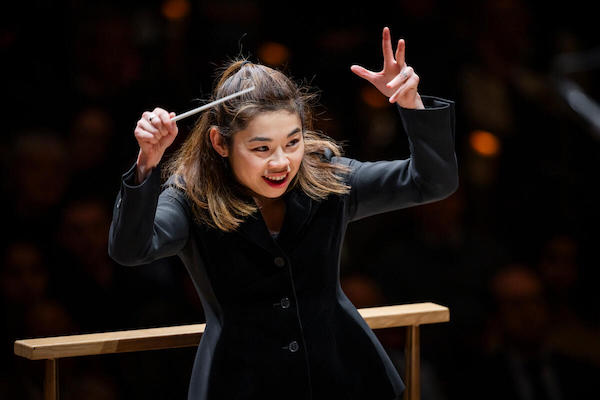Since she became the first woman to win the Donatella Flick Conducting Competition in 2014, Elim Chan has brought ardent energy to orchestras around Europe and the United States, conducting a broad range of music. Her New York Philharmonic debut came this past weekend in a three-concert run of a strong program.
An evocative piece by Jerod Impichchaachaaha’ Tate and a sparkling reading of Martinů’s Cello Concerto No. 1 featuring soloist Sol Gabetta revealed Chan’s fluency with sweeping musical vistas, rich tonal palettes, and fluid exchange between orchestra and soloist. After the intermission, Rimsky-Korsakov’s ever-popular Scheherazade showcased the conductor’s steelier side, as well as the skills of numerous individual orchestra members.
Indigenous Musical Visions
Tate, a Chickasaw classical composer whose music I’ve covered before, was present on Thursday night for the world premiere of the string orchestra version of his Pisachi. Influenced by Pueblo and Hopi folk music, and originally scored for string quartet, the piece was a response to a trove of photographs from the 1970s amassed by the then-newly created Environmental Protection Agency. Tate sought to give voice to the Indigenous peoples whom these images left out.
Today, with the EPA under constant attack from self-interested state governments and industries at the expense of the environment, Pisachi was an evocative reminder of the beauty – and the cultures – at risk as our planet curdles and warms beyond recognition.
The music stands on its own, however. Over a mere 10 minutes or so it conveys half a dozen “landscapes.” It starts with sweeping serenity. A bustling rhythm then underpins a climbing staccato melody that hardens into a prickly wall of sound.
A dirge-like march of crystalline harmonies, conversational passages, eerie dissonances, and churning scales that suggest a stampede ensue. After a return to the celestial intervals of the opening section, the piece concludes with a ferocious build.
Cello Mastery
When Argentine cellist Sol Gabetta joined the New York Philharmonic for the Martinů concerto, Elim Chan’s gift became fully apparent. Cello and orchestra engaged in what felt more like a deep conversation than a soloist with accompaniment. Gabetta is a dynamic stage performer, rocking her body in time to the music, navigating the difficult runs with such brisk dexterity it seemed almost superhuman on an instrument of such a size – was it really a cello up there and not a violin?

By the time the main theme of the first movement reprised, Gabetta and the orchestra had fully established a flowing, electric synergy. The somewhat lyrical second movement was profound and bewitching, with a wondrously expressive cadenza. (A viola joins the cadenza towards its end, creating interestingly eccentric harmonies.) Chan drew from the orchestra a dynamic performance that was effectively modest, never overdone.
The final Allegro had the flavor of a Russian dance at times, with dramatic five-note figures spidering up the scale, and a lovely lyrical section. Chan led with exquisite flow and tightly controlled force. And Gabetta made such an impression with the audience that she returned to play a stirring “Malagueña” as a solo cello encore.
A Thousand and One Notes
A polished but at times somewhat perfunctory Scheherazade followed. Perhaps because I’ve heard the piece too many times on the radio lately – a milieu in which the four-movement suite with its continually circulating themes can seem to go on too long – I may have unfairly expected something that pushed the envelope.

Over the course of the first movement, as the music deepened to gather up the whole orchestra, the interpretive power picked up. Concertmaster Frank Huang’s beautifully sweet tone in the solo violin parts helped elevate the overall artistry. In the second movement I perceived some stiffness in the rhythm, and a slight hesitancy in the passing of solo themes from one instrument to another – though, as one can expect with the New York Philharmonic, all soloists and sections acquitted themselves individually just fine.
It was amid the triple-tonguing winds and blustery percussion of the final movement that Chan’s gifts flowered most brightly, in an authoritative climax to a concert that taken as a whole revealed why this conductor is making such a name for herself.
 Blogcritics The critical lens on today's culture & entertainment
Blogcritics The critical lens on today's culture & entertainment




